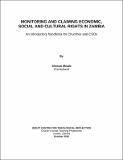Monitoring and Claiming Economic, Social and Cultural Rights in Zambia

View/
Date
2010Author
Mwale, Simson
Type
BookLanguage
enItem Usage Stats
91
views
views
78
downloads
downloads
Abstract
One of the basic foundations of human dignity is the enjoyment and/or realisation of economic, social and cultural rights (ESCR). ESCR are entitlements which guarantee that socio-economic opportunities are made available, accessible and affordable by the State in order for the citizens to live a life befitting a human being. It is therefore necessary that people enjoy their rights to food, work, education, health and housing in order for them to live decently and to fully develop. However, as one human right activist puts it, “when women and men cannot find jobs which provide just wages; when people cannot afford to buy food or are unable to access food for themselves and their families; when parents cannot send their children to school; when individuals are not able to access basic health care services, this means that not only is their existence inhuman, but also that their economic, social and cultural rights are violated”. These negative conditions indicate failure on the part of the State to fulfil its human rights obligations to its citizens and entail the urgency for citizens to claim their rights to realise their dignity. This is why knowing one’s human rights is a necessary condition for people to claim and assert them. Having a firm grasp and understanding of basic human rights concepts, principles and approaches provide people with a tool that guide them towards appropriate action. The role that Churches and Non-Governmental Organisations (NGOs) play in the education of human rights cannot therefore be overlooked. Churches and NGOs have a civic responsibility to educate the citizenry and to ensure that the Zambian government complies not only to its international obligations but also with its domestic obligations. A commitment to international instruments, declaration and optional protocols is not enough to ensure effective protection and promotion of ESCR in Zambia. Churches and NGOs must, among others, ensure that they increase their capacity to understand and apply the appropriate domestic and/or international, and regional human rights system; develop effective internal systems, procedures and plans to address implementation of ESCR; and identify the most effective and appropriate strategies to address particular issues related to ESCR.
Description
This introductory handbook by the Jesuit Centre for Theological Reflection (JCTR) is written with the aim of equipping Churches and NGOs working in Zambia with knowledge and skills to engage with the government to comply with its international obligations on the realisation of ESCR, and to intervene, prevent and/or stop the violation of ESCR. There is no doubt that familiarity with issues such as scope, nature of State obligations, monitoring and documentation of human rights violations, will help Churches and NGOs to conduct their advocacy and lobby efforts of fostering implementation of ESCR in Zambia more effectively. The main aim of this handbook is to help Churches, human rights organisations, and interested individuals in monitoring Zambia’s commitment to the realisation of ESCR. Therefore, the handbook has a two-fold purpose. Firstly, it provides basic essential information on monitoring and claiming ESCR in Zambia based on international human rights standards, especially through the United Nations (UN) and the African human rights systems. Secondly, it gives useful insights on monitoring and claiming ESCR in Zambia using the current constitutional and/or other available local remedies such as the human rights commission. The handbook is one of the recent documents by the JCTR on the status and realisation of ESCR in Zambia.